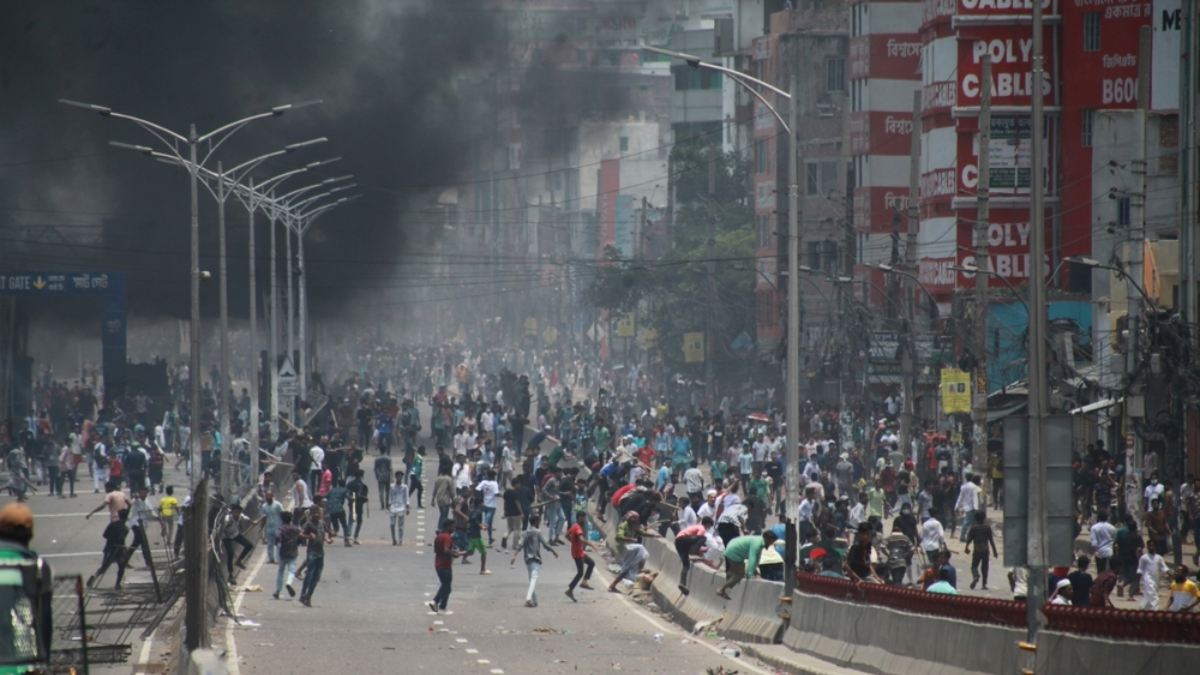How Bangladesh Fell Into An Information Blackout
Sabhanaz Rashid Diya / Jul 25, 2024
Dhaka, Bangladesh - July 18, 2024. Anti-quota protestors and backers of the government clash amidst protests. Shutterstock
Arms stretched out and unarmed, 25-year-old Abu Sayeed stood in front of the police, almost believing he would not get shot. In three consecutive rounds, Sayeed was directly hit in his chest and killed using 12-gauge shotguns by two officers from the Bangladesh Police, standing 15 meters apart from him. Sayeed was one of the thousands of protesters in Bangladesh who were marching on the streets against the government’s discriminatory policies.
Since early July, student-led demonstrations across the country have demanded reforms to the quota system for coveted civil service jobs, which reserves 56 percent of positions for quota holders. The protests followed a decision of the High Court Division reinstating the quota system, which was abolished by an executive order following similar protests in 2018. Protesters argue that the current allocation of 30 percent government jobs to descendants of war veterans unfairly favor supporters of the ruling party amid growing youth unemployment, and call for urgent reforms.
The peaceful demonstrations were met with hostility and police brutality, reportedly killing nearly 180, mainly students, in the past 10 days. Sayeed was one of the first, and videos of his killing spread like wildfire on social media. Across the country, people took to the streets, chanting for justice and accountability. The government responded by severely cracking down on the protesters, including use of live and rubber bullets., and imposed a nationwide curfew. On July 18, all Internet services were shut down indefinitely, throwing the country’s 170 million people into an information blackout.
A crisis years in the making
The escalating situation in Bangladesh reveals growing resentments towards the Awami League government’s rule and its inability to address policy and political crises. Having surrounded herself with sycophants in court during fifteen years of uninterrupted reign, Prime Minister Sheikh Hasina appears to have lost touch with her constituents, especially the younger generation, who face extreme uncertainties with rising unemployment, corruption, inflation, and unattainable costs of living. The erosion of rule of law and human rights has led to the collapse of institutions that are unable to function independently or in the public interest, resulting in a gaping trust deficit between the state and its citizens. The Prime Minister could have acknowledged any of these inadequacies; instead, she resorted to violence, and pitted the country’s future against her government.
The Awami League government’s ascendance to power following the general election in 2008 has heavily centered on the promise to digitize the country and use technology to build political capital with its youth population of 50 million. In fifteen years, Internet penetration has risen from 3 to 40 percent, although the country’s telecom regulator contends it is over 80 percent of the population. Mobile financial services grew by 46 percent between 2020 and 2022 alone. A booming tech sector generates $1.4 billion in export income every year. With the support of the World Bank and development financing partners, nearly 90 percent of adults in the country have a national identity card, increasingly with biometric data, that “brings people online” by connecting with all government and ICT-related services.
The success of digitization in Bangladesh has overshadowed the significant consolidation of control over digital infrastructure and services that occurred over the last two decades. After coming to power, the Awami League government amended the telecom law to require telecom and internet services operators to provide unfettered access to personal data and lawful interception in exchange for a license to operate in the country. A 2021 proposal to the law curtailed the independence of the telecom regulator as a statutory body and conferred more powers to the politicized line ministry, including the appointment of its chairperson. This enables politicians to arbitrarily order network shutdowns to internet service providers, block specific websites, or issue content removal requests to social media platforms if it exposes corruption or human rights violations. These extra-judicial orders are often communicated over the phone with no procedural safeguards or documentation, creating a culture of impunity and undermining transparency.
In the last decade alone, various similar legal and licensing instruments have empowered Bangladeshi government bodies with unprecedented access to private data and digital lives of its citizens. The 2013 amendments to Bangladesh’s Information, Communication & Technology Act (ICTA) extended the government’s control over online speech and privacy, including provisions that allow the police to arrest anyone allegedly sharing anti-government or defamatory content on digital platforms without any proof or due process. Controversial sections of the ICTA were replaced by the Digital Security Act (DSA) in 2018, and subsequently, the Cyber Security Act (CSA) in 2023, however, human rights groups argue they retain sections criminalizing speech that “disrupts public order” or “hurts the image of the nation” and are routinely weaponized by the ruling party and its supporters to stifle political speech or detain activists. Between 2018 and 2023, nearly 1,500 cases were filed under the DSA, of which 451 cases were against journalists. Additionally, these laws provide discretionary powers to law enforcement to search and seize devices, compel disclosure of passwords, and mandate state-sanctioned interception for any imported network devices. None of the obligations extend to public agencies, whose data records are deemed to fall under critical information infrastructure and can be exempted from information requests filed by journalists and human rights defenders.
In a 2023 investigation, the newspaper Haaretz found that the Bangladesh government bought Israeli surveillance technology despite having no diplomatic relationship with the country. A separate investigation from Al Jazeera in 2021 found spy tech purchases from PicSix, an Israel-based firm run by former intelligence officers. The purchase included IMSI-catchers that allow intelligence agencies to intercept and geo-track mobile traffic during demonstrations like the one erupting across the country today.
But this is just the tip of the iceberg.
Bangladesh’s ambitious plans for the 2030 Sustainable Development Goals (SDGs) centers on leveraging a centralized biometric identity system to enable poverty reduction, job creation and economic mobility. The present-day identification database is widely used to receive government services, purchase SIM cards and open a bank account, resulting in an interoperable data architecture. Last year, the parliament passed the National Identity Registration Act which transfers the ownership of the identity database—which initially was created to register voters—from the Election Commission to the Ministry of Home Affairs. The transfer allows law enforcement and intelligence agencies with unrestricted access to personal data. In fact, a Wired investigation found that the National Telecommunication Monitoring Center—an intelligence outfit under the home affairs ministry—leaked fingerprint photos, blood group, vehicle registrations, and similar 120 data points of millions of Bangladeshis online that were sold on Telegram channels. It is unclear why a spy outfit is collecting, storing and accessing such a large volume of sensitive personal data belonging to ordinary citizens, but rings alarm about how digitization of every facet of an individual’s life is abused into creating an ever-expanding and sophisticated surveillance ecosystem.
The government’s relentless pursuit to centralize control over digital infrastructures and services did not happen in a vacuum. Over the years, the commercial sector, including American technology companies, multilateral financing institutions and civil society have given into demands in exchange for lucrative contracts, privileged access, or overriding regulatory checks and balances. For example, in 2021, Oracle signed an agreement with the information technology ministry to offer “sovereign-hosted” cloud solutions to the government despite ongoing criticisms against the country’s draft data protection bill. The bill mandated local data storage for domestic and international organizations that civil society argued would severely exacerbate surveillance and censorship.
Pull the curtains
And so, today, when the very youth who were the supposed beneficiaries of the country’s digital promises used technology to demand accountability and justice, the government turned on their backs and pulled a single kill switch that would surgically and effectively shut down the Internet nationwide. In the 100 hours that Bangladesh went offline, essential services such as financial transactions, power and healthcare, were brought to a standstill. The digital commerce sector was estimated to have lost $5 million every day. Media organizations went into a de facto blackout, and with no alternate sources of information available, gave the public a partial narrative of the events. In a recent statement, Telenor Group publicly expressed its concerns over the government’s order to its Bangladesh mobile operator, Grameenphone, to shut down 4G and 3G services—a first in its 25-year history of operating in the country.
But this outrage is too little, too late. Between 2019 and 2023, the country experienced multiple instances of internet disruptions with neither transparency provided by any mobile operator to their subscribers, nor substantive opposition from the country’s private sector and fragmented civil society. For too long, fundamental rights of citizens were traded for business deals, allowing the government to systemically insinuate itself into the core infrastructure that forms the Internet, giving it absolute power over its access and use.
Amid the shutdown, the Appellate Division of the Supreme Court of Bangladesh ordered the quota allocation to be reduced to 7 percent in an emergency hearing. But things have moved past demands for a fairer job recruitment system to an uprising against the government’s years of heavy-handed rule that denied citizens their fundamental rights and dignities and cracked down on anyone seeking redress and transparency. On the eve of July 23, when the government finally decided to “bring back the Internet” in very limited capacity, including keeping social media platforms blocked, it opened the floodgates to hell. Videos and testimonies of killings and destruction by the police and state-backed goons were everywhere, and Bangladesh seemed to have woken up from a communication blackout only to collapse back into a democracy apocalypse.
Bangladesh is at its most difficult crossroads since its independence just over 50 years ago, also borne out of a violent student movement. The Prime Minister and her allies are caught between a rock and a hard place with little legitimacy left with the younger population, who have shown extraordinary courage and sacrifice in exposing cracks in her governance that generations before them have been complicit in enabling. Perhaps her government still believes it can make a comeback in the same way it has always swept human rights allegations under the rug. The power to bring truth to account now rests with the country’s population, its diaspora, and its international partners, who have a rare opportunity to act in the greater interest of the country’s future. At the very least, this should be an overdue wakeup call that the status quo does not work anymore, and that fundamental freedoms should never be traded for short-term fixes. We all have blood on our hands if we let this slide.
Authors
